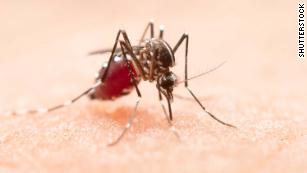First native Zika cases in Europe confirmed as experts warn climate change could bring more
By Rob Picheta From CNN

(CNN) The first native cases of Zika in Europe have been confirmed after three people became infected with the virus in France. Experts warn that climate change could lead to more cases emerging across the continent.
Three people caught Zika in Hyères, southern France, in August this year, the European Centre for Disease Prevention and Control has confirmed.
While Europe dealt with hundreds of imported cases during the outbreak of the virus three years ago, it never had a native case — where local mosquitoes developed and spread the virus — before now.
All three patients developed symptoms within a few days of each other, the ECDC said, meaning they were likely part of the same transmission cycle. They have recovered, and the risk to residents and travelers to the region is low, the organization added.
But the Earth’s warming climate and increased travel between continents means that tropical diseases including Zika are becoming more likely to flourish in Europe, experts have said.
The findings are “the first time that locally acquired Zika cases were identified, which poses new challenges for the control of these diseases,” Moritz Kraemer, a researcher into infectious diseases at the University of Oxford, told CNN.
Scientists had been expecting some insect-bite infections to occur in Europe, as previously seen with dengue fever, Kraemer added. But it was “unexpected” to see Zika transmission, because it is usually associated with the Aedes aegypti mosquito.
While that mosquito isn’t commonly found in southern Europe, another one — Aedes albopictus — is.
The mosquito “has become common in parts of southern France, where it has probably also been responsible for transmission of dengue. It has also been detected widely throughout southern Europe and sporadically further north,” Anna Checkley, consultant in Tropical Medicine at the Hospital for Tropical Diseases (HTD), said.
“Warmer temperatures favor its survival, and as we go into winter it is much less likely that we will see further new cases. (But) if global temperatures increase, this mosquito may spread further north in Europe and we may see small clusters of cases further north.
“The UK’s Department of Health warned earlier this year that climate change could result in tropical diseases making their way to Britain — and a study by Kraemer’s team at the University of Oxford has found that climate change could expose half of the world’s population to disease-spreading mosquitoes by 2050.
Risks to pregnant women
Zika virus was first identified 70 years ago in the Zika forest of Uganda. Isolated, small-scale outbreaks have occurred in various parts of the world, including Africa, Southeast Asia and the Pacific islands, but no major complications had been linked to the virus until it arrived in Brazil, which has been reporting an extensive outbreak to the World Health Organization since March 2015, and soon spanned to Central and South America.Get CNN Health’s weekly newsletter
As of March 2018, the US Centers for Disease Control and Prevention estimated there were at least 90 countries and territories with active Zika virus transmissions.
Most people infected with Zika virus won’t have symptoms. Of those that do, fever, rash, joint pain and conjunctivitis (red eyes) are the most common symptoms of Zika virus. Some patients may also experience muscle pain or headaches.
The main concern is about women who are pregnant or might become pregnant, as the virus can cause microcephaly — a neurological disorder that results in babies being born with abnormally small heads, which in turn can cause severe developmental issues and sometimes death.
A Zika infection may cause other birth defects, including eye problems, hearing loss and impaired growth. Miscarriage can also occur.
“The risk of travellers acquiring Zika in southern Europe remains low,” Checkley reminded tourists. “However, all travelers spending time outdoors should be mindful of taking bite avoidance precautions as there are many infections which can be transmitted by biting mosquitoes and ticks.”
For more on this story go to: https://edition.cnn.com/2019/11/07/health/zika-europe-cases-scn-intl/index.html





